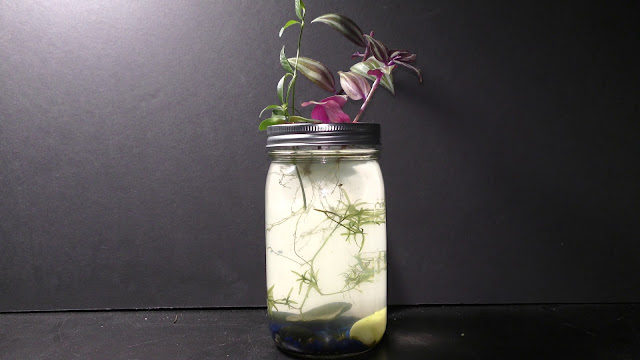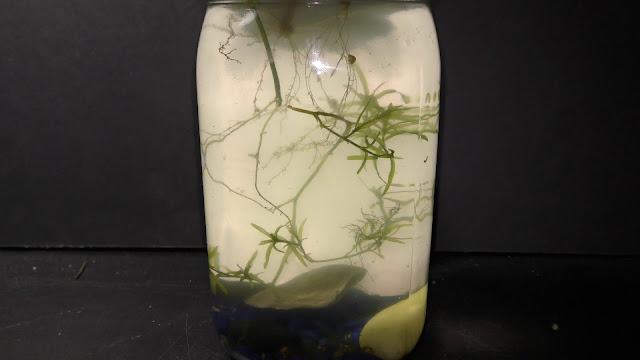Here is one of my sustainable aquarium gardens in which I don't change water nor use man made filters.
It looks nice and is clean of green algae.
In previous videos, I explained how I control algae in my aquariums without water changes and using just plants instead of filters.
It works great all year around for preventing algae bloom.
Which we should not confuse with normal algae deposits that can be found in all live aquariums.
Like this for example.
You can see deposits of green algae on the rocks in an aquarium with a continuously running filter in a pet store I visited.
Turning off the filter in this aquarium or failure to remove wilting plants from aquarium usually results in a growth of excessive amounts of otherwise healthy green algae that makes water green and dangerous.
Let's check how dangerous algae bloom can get in aquariums and what we can do about it.
This aquarium has been populated with snails, scuds, and plants.
The common green algae started building up after I stopped removing wilting plants from this nursery.
You may already notice some cloudy greenish discoloration of the water on June 4th, 2020.
Apparently, small land plants on top are not enough to hold back the algae growth.
I add a cutting of slow growing Lesser Periwinkles to see if it helps to reduce algae growth.
Scuds, snails, and planarian are moving around here and there.
Those are just a few of the many tiny aquatic critters that feed on algae.
There is guppy grass and land moss growing underwater.
It's easier to judge about water clarity in comparison to something.
Here we go.
The nursery on the left is visibly algae free, the way I usually keep my aquarium gardens :)
The next day I added a cutting of ivy.
Usually, I add land plants before algae starts building up.
It's easier to prevent than to treat algae.
We will see how it goes - that is what experiments are for ;)
10 days later on June 15th.
Water is noticeably greener.
Snails are doing fine.
I replace the ivy cutting with another already rooted ivy.
5 days later on June 20th I added a rooted cutting of fast growing Ornamental Sweet potato.
Here you can see it in the back.
Let me show you the root of this cutting.
It's about 2 cm long now.
Another 5 days later, on June 25th.
The water is cloudy and green.
Guppy grass is dying.
Ornamental sweet potato is blooming and has nice roots.
July 31st.
It's been about 2 months since I started the experiment.
I add dechlorinated water to the level.
Water mostly evaporates through leaves of land plants.
The larger the plants grow, the more water I have to add.
Here you can see roots grow very strong.
And there are some young scuds feeding on those roots.
The water is cloudy and greenish.
Aquatic plants are mostly diminished.
I start adding water weekly.
August 12th.
The water remains cloudy and greenish.
August 26th.
I trim the sweet potato for a second time already.
All land plants look good and have strong roots.
It's been almost 3 months since algae started blooming in this nursery.
Algae bloom did not stop land plants from growing.
And land plants did not stop algae from blooming either.
There is very little left from aquatic plants after months of algae bloom.
The water is less green now but still cloudy.
Let's turn the aquarium around for you to take a closer look at the remains of the aquatic plants.
Also, I see only young small snails and scuds.
And planarian.
The old large snails and scuds most likely died of low oxygen during algae bloom.
Low oxygen is also the cause of aquatic plants’ misery during algae bloom.
On October 10th, I made a time-lapse recording to check on critters in this nursery.
Some young snails and scuds moving around here and there.
The water is much cleaner now, but still some clouds - and it's been about 5 months!
The aquatic plants slowly recovered as algae get subdue by land plants.
It took many months for a 1 liter aquarium to recover after algae bloom.
I wonder how long it would take a larger aquarium to recover, if ever...
Preventing algae bloom is much easier than treating it for sure.
Have fun and happy aquarium gardens :)
















































No comments:
Post a Comment